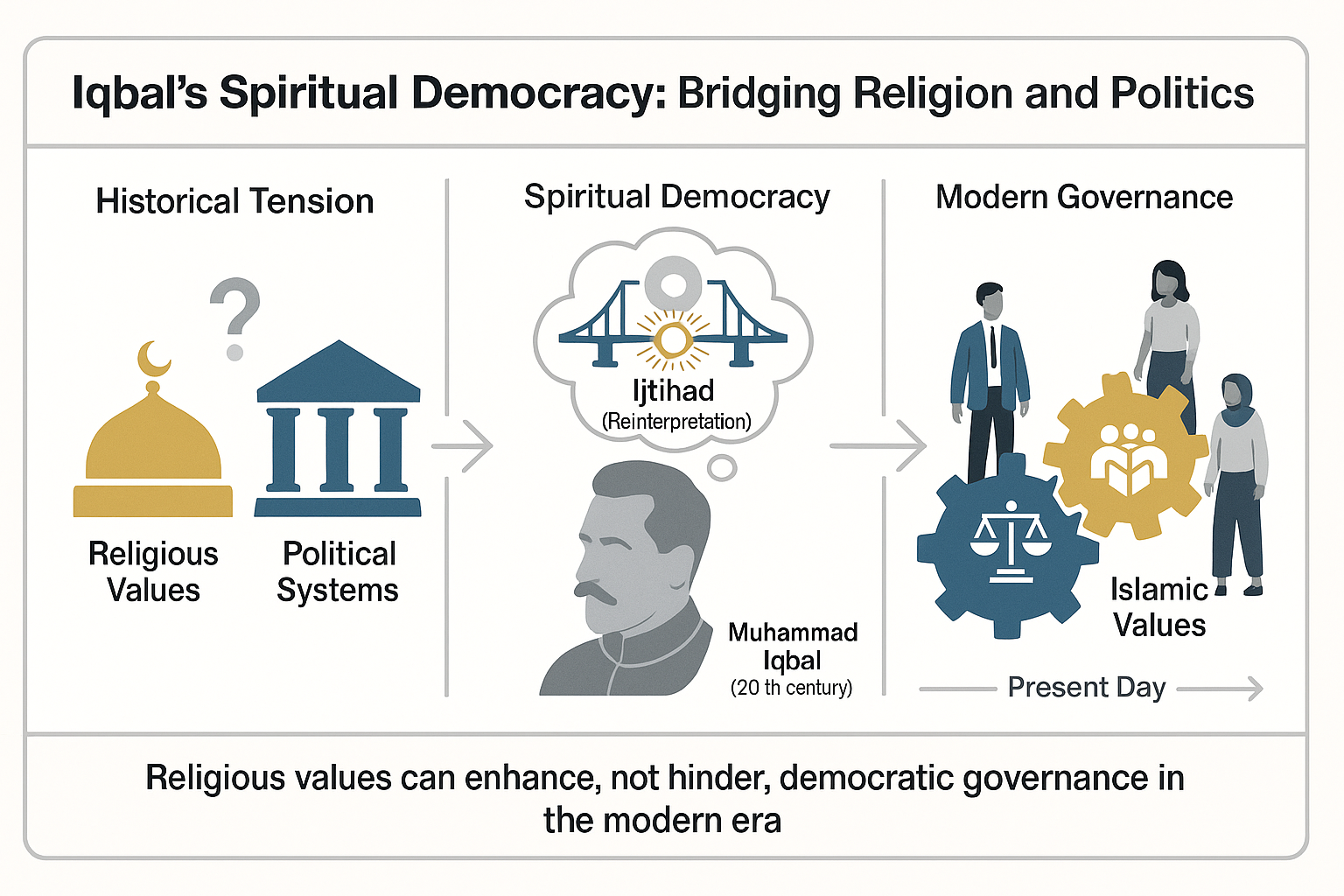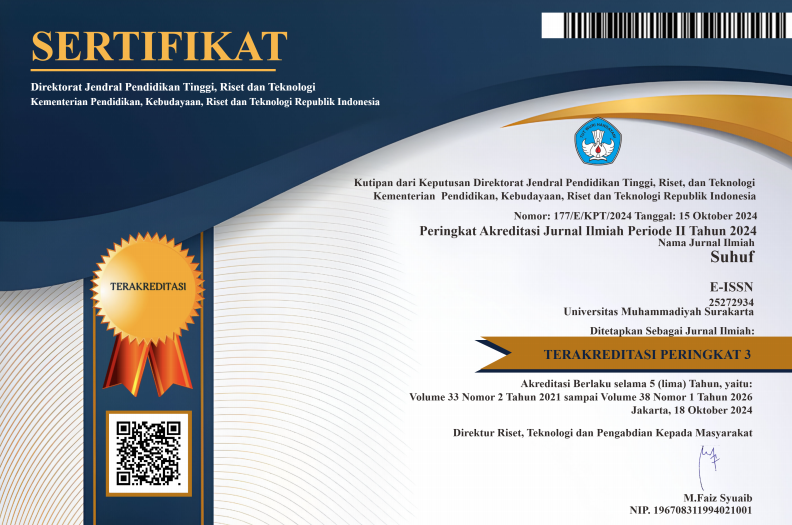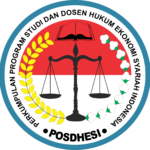The Relationship Between Religion and Politics of Muhammad Iqbal: A Philosopical and its Relevance
DOI:
https://doi.org/10.23917/suhuf.v37i1.10286Keywords:
Islamic political thought, Ijtihad , Islamic values , Spiritual democracy , Religion and politicsAbstract
From classical times to the modern era, the relationship between religion and politics has been a never-ending debate. On the one hand, religion is considered a moral foundation that directs political action towards justice and the welfare of the people, while on the other hand, the political world is often separated from the spiritual dimension to maintain objectivity and individual freedom. In this article, Muhammad Iqbal, a prominent Muslim thinker from the 20th century, opposes secularism and proposes a spiritual democracy system, which combines the principles of democracy with Islamic values to create a just and prosperous government. Through ijtihad, Muslims are invited to interpret Islamic teachings to be relevant to the challenges of the times. The research method uses qualitative with a literature study approach (library research). The main focus of this study is how Muhammad Iqbal views the relationship between religion and politics, and to what extent Muhammad Iqbal's thoughts are relevant in the modern era. The results of this study found two interesting things, namely: first, Muhammad Iqbal's thoughts on the relationship between religion and politics emphasize the importance of combining the principles of democracy and Islamic moral values in the system of government. Second, Muhammad Iqbal's thoughts on the relationship between religion and politics remain relevant in the modern socio-political context.
Downloads
References
[1] M. Chalis, “Muhammad Iqbal Paham Dinamisme Islam [Muhammad Iqbal Understands the Dynamism of Islam],” 2024. [Online]. Available: https://d1wqtxts1xzle7.cloudfront.net/113364885/MAKALAH_Paham_Dinamisme_Islam_Muhammad_Iqbal-libre.pdf?1713190514=&response-content-disposition=inline%3B+filename%3DMAKALAH_Paham_Dinamisme_Islam_Muhammad_I.pdf&Expires=1747456470&Signature=Ic4Kd4QhUy0L12fx
[2] A. A. Pahutar, “Rekonstruksi pemikiran Islam Muhammad Iqbal [The Reconstruction of Muhammad Iqbal’s Islamic Thought],” I’tiqadiah J. Huk. dan Ilmu-ilmu Kesyariahan, vol. 1, no. 2, pp. 141–168, (in Indonesia), 2024, doi: https://doi.org/10.63424/itiqadiah.v1i2.48.
[3] A. Hawi, “Muhammad Iqbal dan Ide-Ide Pemikiran Politiknya [Muhammad Iqbal and His Political Thought Ideas ],” Madania J. Kaji. Keislam., vol. 20[1] A. H, no. 2, pp. 241–250, (in Indonesia), 2016, [Online]. Available: https://core.ac.uk/download/pdf/229569533.pdf
[4] M. Mutamimah and M. Miski, “Menimbang Otoritas Perempuan [Weighing the Authority of Women],” SUHUFjurnal Pengkaj. Alquran dan budaya, vol. 17, no. 2, pp. 231–256, (in Indonesia), 2024, doi: https://doi.org/10.22548/shf.v17i2.1033.
[5] W. Darmalaksana, “Metode Penelitian Kualitatif Studi Pustaka dan Studi Lapangan,” Pusat Perpustakaan UIN Sunan Gunung Djati Bandung, 2020. [Online]. Available: http://digilib.uinsgd.ac.id/id/eprint/32855
[6] M. N. Aini, N. G. Halim, M. Muhid, and I. L. Muthoharoh, “A Study of Hadiths About Riya’ in the Book of Hidayatus Salikin Perspective of Abdul Samad Al-Falimbani,” Suhuf Int. J. Islam. Stud., vol. 36, no. 1, pp. 1–11, May 2024, doi: https://doi.org/10.23917/suhuf.v36i1.3431.
[7] M. Salik, “Rekonstruksi Pemikiran Agama Dalam Mencegah Kemunduran Moralitas Pemuda (Telaah Pemikiran Sir Muhammad Iqbal) [Reconstructing Religious Thought in Preventing the Decline of Youth Morality (A Study of Sir Muhammad Iqbal’s Thought)],” J. Filsafat Indones., vol. 5, no. 1, pp. 47–52, (in Indonesia), 2022, doi: https://doi.org/10.23887/jfi.v5i1.36375.
[8] M. M. Ramin, “Rekonstruksi Falsafah Pendidikan Muhammad Iqbal Di Era Society 5.0 [The Reconstruction of Muhammad Iqbal’s Educational Philosophy in the Era of Society 5.0],” QuranicEdu J. Islam. Educ., vol. 2, no. 2, pp. 192–210, (in Indonesia), 2023, doi: https://doi.org/10.37252/quranicedu.v2i2.399.
[9] M. Nasir, “Akal dan Wahyu dalam Persfektif Muhammad Iqbal [Reason and Revelation in the Perspective of Muhammad Iqbal],” Hijaz J. Ilmu-Ilmu Keislam., vol. 2, no. 1, pp. 27–31, (in Indonesia), 2022, [Online]. Available: https://www.jurnal.medanresourcecenter.org/index.php/HIJ/article/view/876
[10] B. Salimah, “Epistemologi Eksistensialisme Muhammad Iqbal dan Relevansinya bagi Ilmu Pendidikan (Islam) [The Epistemology of Muhammad Iqbal’s Existentialism and Its Relevance to (Islamic) Education Science],” Revorma J. Pendidik. dan Pemikir., vol. 3, no. 2, pp. 8–14, (in Indonesia), 2023, [Online]. Available: http://ejournal-revorma.sch.id/index.php/mansa/article/view/95
[11] S. Hidayatullah, “Perspektif Filosofis Sir Muhammad Iqbal Tentang Pendidikan Islam [The Philosophical Perspective of Sir Muhammad Iqbal on Islamic Education],” J. Pendidik. Islam, vol. 2, no. 2, pp. 419–440, (in Indonesia), 2013, doi: https://doi.org/10.14421/jpi.2013.22.419-440.
[12] S. Hidayatullah, “Epistemologi Pemikiran Sir Muhammad Iqbal [The Epistemology of Sir Muhammad Iqbal’s Thought],” J. Filsafat, vol. 24, no. 1, pp. 94–118, (in Indonesia), 2014, [Online]. Available: https://digilib.uin-suka.ac.id/id/eprint/34861/
[13] Y. F. Aristyasari, “Pendidikan Islam Progresif Muhammad Iqbal [Muhammad Iqbal’s Progressive Islamic Education],” Al Ghazali, vol. 2, no. 2, pp. 32–50, (in Indonesia), 2019, [Online]. Available: https://ejournal.stainupwr.ac.id/index.php/al_ghzali/article/view/121
[14] S. Ja’far, “Epistemologi Tindakan Muhammad Iqbal [The Epistemology of Muhammad Iqbal’s Action],” Teosof. J. Tasawuf Dan Pemikir. Islam, vol. 5, no. 1, pp. 80–106, (in Indonesia), 2015, doi: https://doi.org/10.15642/teosofi.2015.5.1.80-106.
[15] T. Budiyanto, “Hermeneutika Hadist: Studi Pemikiran Muhammad Iqbal [Hermeneutics of Hadith: A Study of Muhammad Iqbal’s Thought],” Khulasah Islam. Stud. J., vol. 2, no. 1, pp. 71–84, (in Indonesia), 2020, doi: https://doi.org/10.55656/kisj.v2i1.28.
[16] N. Rohmah, “Pendidikan Islam dan Insan Kamil; Anatomi Pemikiran Muhammad Iqbal [Islamic Education and the Perfect Human; The Anatomy of Muhammad Iqbal’s Thought],” EL-BANAT J. Pemikir. dan Pendidik. Islam, vol. 13, no. 2, pp. 231–253, (in Indonesia), 2023, doi: https://doi.org/10.54180/elbanat.2023.13.2.231-253.
[17] D. T. Indrajaya, “Konstribusi Pemikiran Muhammad Iqbal dalam Pembaharuan Hukum Islam [The Contribution of Muhammad Iqbal’s Thought in the Reform of Islamic Law],” Huk. Islam, vol. 13, no. 1, pp. 1–12, (in Indonesia), 2013, doi: http://dx.doi.org/10.24014/hi.v13i1.962.
[18] M. R. Masykur, “Pembaharuan Islam Di Asia Selatan Pemikiran Muhammad Iqbal [Islamic Reform in South Asia: The Thought of Muhammad Iqbal],” J. Al-Makrifat, vol. 3, no. 1, pp. 1–14, (in Indonesia), 2018, [Online]. Available: https://core.ac.uk/reader/234800640
[19] R. Riyanto, “Pembaharuan Pendidikan Islam Menurut Muhammad Iqbal [Islamic Education Reform According to Muhammad Iqbal],” Ta’dibuna J. Pendidik. Islam, vol. 11, no. 4, pp. 557–573, (in Indonesia), 2022, doi: https://doi.org/10.32832/tadibuna.v11i4.6401.
[20] Z. Kholidah, “Relevansi pemikiran Muhammad Iqbal dalam pembentukan karakter siswa di era millenium [The Relevance of Muhammad Iqbal’s Thought in Shaping Student Character in the Millennium Era],” TA’LIM J. Stud. Pendidik. Islam, vol. 1, no. 2, pp. 288–308, (in Indonesia), 2018, doi: https://doi.org/10.52166/talim.v1i2.953.
[21] M. Masluhah, K. R. Afifah, and M. Salik, “Pemikiran Muhammad Iqbal Tentang Pendidikan Karakter Dan Relevansinya Dengan Era Disrupsi [Muhammad Iqbal’s Thought on Character Education and Its Relevance to the Disruption Era],” Ta’allum J. Pendidik. Islam, vol. 9, no. 2, pp. 317–338, (in Indonesia), 2021, doi: https://doi.org/10.21274/taalum.2021.9.2.317-338.
[22] T. Ajuba, “Pemikiran Pendidikan Islam Menurut Muhammad Iqbal [Islamic Education Thought According to Muhammad Iqbal],” Irfani (e-Journal), vol. 20, no. 1, pp. 85–94, (in Indonesia), 2024, [Online]. Available: https://journal.iaingorontalo.ac.id/index.php/ir/article/view/3595
[23] A. M. Lubis, “Kontribusi Muhammad Iqbal Terhadap India-Pakistan Tahun 1876-1938 [The Contribution of Muhammad Iqbal to India-Pakistan from 1876 to 1938].” UIN Ar-Raniry, p. (in Indonesia), 2019. [Online]. Available: https://repository.ar-raniry.ac.id/id/eprint/11186/
[24] A. Saepulah, “Pentingnya Ijtihad Dalam Agama Perspektif Muhammad Iqbal Dan Implikasinya Bagi Teologi Dan Kemiskinan [The Importance of Ijtihad in Religion: Muhammad Iqbal’s Perspective and Its Implications for Theology and Poverty],” J. Ilmu Agama Mengkaji Doktrin, Pemikiran, dan Fenom. Agama, vol. 22, no. 2, pp. 218–237, (in Indonesia), 2021, doi: https://doi.org/10.19109/jia.v22i2.10966.
[25] A. N. A. A. Utomo, “Relasi Seni dan Agama: Studi Perbandingan atas Pemikiran Muhammad Iqbal dan Theodor Adorno [The Relationship Between Art and Religion: A Comparative Study of the Thoughts of Muhammad Iqbal and Theodor Adorno].” FU, p. (in Indonesia), 2024. [Online]. Available: https://repository.uinjkt.ac.id/dspace/handle/123456789/82300
[26] A. M. Furkon, “Zakat sebagai Instrumen Welfare State Dalam Islam [Zakat as an Instrument of the Welfare State in Islam],” J. Syntax Imp. J. Ilmu Sos. Dan Pendidik., vol. 4, no. 6, pp. 752–767, (in Indonesia), 2024, [Online]. Available: https://jurnal.syntaximperatif.co.id/index.php/syntax-imperatif/article/view/312

Downloads
Submitted
Accepted
Published
How to Cite
Issue
Section
License
Copyright (c) 2025 Fathul Ghaffari , Khoirul Faizin , Ahmad Afif , Suud Sarim Karimullah , Moh. Rosil Fathony

This work is licensed under a Creative Commons Attribution 4.0 International License.


















